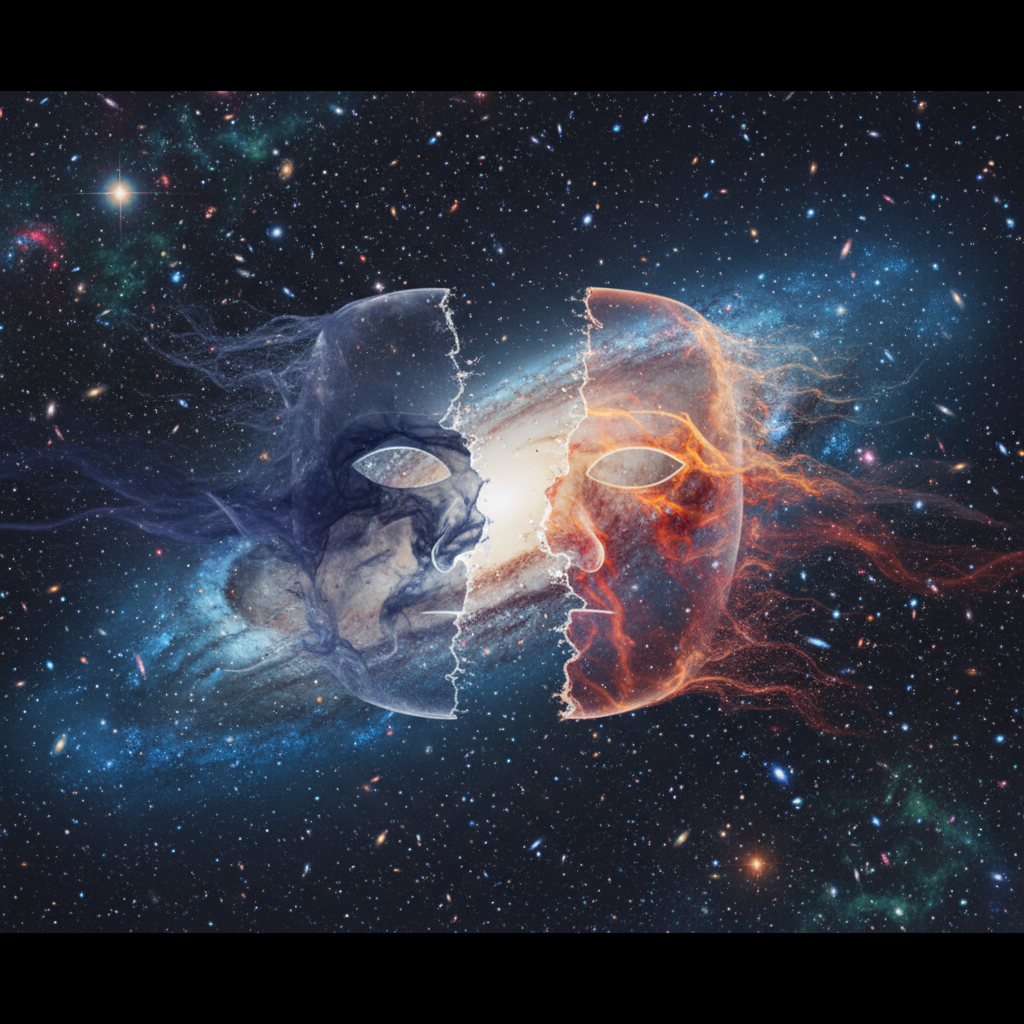The Universe is Full of Surprises: What if Dark Matter and Dark Energy Don’t Exist?
For decades, the concepts of dark matter and dark energy have been the cosmic glue holding our understanding of the universe together. These invisible, mysterious entities are theorized to make up a staggering 95% of everything, explaining everything from the rotation of galaxies to the accelerating expansion of the universe. But what if all of this — these cornerstone theories of modern cosmology — are simply… wrong? A recent study has dropped a bombshell, suggesting that dark matter and dark energy might not exist at all. This isn’t just a minor tweak to our cosmic models; it’s a potential revolution, forcing us to re-examine the very fabric of reality.
The Enigmatic Duet: Dark Matter and Dark Energy Explained (or So We Thought)
Before we delve into the potential unraveling of these concepts, let’s briefly recap why physicists invented them in the first place. Imagine a spinning merry-go-round. The outer horses need a stronger force to stay on than the inner ones. Similarly, galaxies rotate much faster than the visible matter within them would allow, threatening to fling stars into the void. To explain this gravitational anomaly without breaking the laws of physics, scientists proposed the existence of *dark matter* – an invisible, non-interacting substance that provides the extra gravitational pull. It’s like the silent, unseen hand guiding the cosmic dance.
Then came *dark energy*. Observations in the late 1990s revealed that the universe’s expansion isn’t slowing down due to gravity, as once expected, but is actually *accelerating*. This was a monumental discovery, prompting the need for an equally monumental explanation. Dark energy was coined as a mysterious force inherent to the vacuum of space itself, pushing galaxies apart. It’s the cosmic engine revving up the expansion, making the universe bigger and emptier at an ever-increasing rate. Together, dark matter and dark energy form the Standard Model of Cosmology, a framework that has successfully explained a vast range of astronomical observations for decades.
A Radical Reinterpretation: The Case Against the “Dark” Side
So, what does this new study propose? Instead of invoking invisible substances and inexplicable forces, some researchers are returning to the drawing board, re-evaluating the fundamental laws of gravity themselves. The core idea is that perhaps our understanding of gravity, specifically Einstein’s General Theory of Relativity, might need modification on cosmological scales. It’s not that General Relativity is wrong within the solar system or even within individual galaxies; it’s that its behavior might differ when applied to the vast, empty expanses of the universe.
One prominent alternative is the Modified Newtonian Dynamics (MOND) theory, which suggests that gravity acts differently at very low accelerations, typical of the outer regions of galaxies. Instead of adding dark matter, MOND modifies the gravitational force itself, allowing observations to align with predictions without the need for an unseen component. While MOND has had some successes in explaining galactic rotation curves, it has struggled to fully account for observations at larger, cosmic scales, such as galaxy clusters and the cosmic microwave background. However, this new study represents a refreshed and potentially more comprehensive approach to modifying gravity, aiming to explain *both* galactic dynamics and cosmic expansion without dark matter or dark energy.
The Stakes Are High: Implications for Our Understanding of the Universe
If this new research gains traction and survives rigorous peer review and further observational tests, the implications would be nothing short of revolutionary. Imagine the ripple effect this would have across virtually every branch of astrophysics and cosmology. Our textbooks would need to be rewritten. Decades of research dedicated to detecting dark matter particles or understanding the nature of dark energy would be redirected. It’s like finding out that the hidden gears you thought were powering a complex machine were never there; the machine was just designed differently than you assumed.
For example, experiments like the Large Hadron Collider, which have searched for WIMPs (Weakly Interacting Massive Particles), a leading candidate for dark matter, might find their objectives fundamentally altered. Similarly, efforts to map the distribution of dark energy through vast surveys of galaxies would need a complete re-evaluation of their theoretical underpinnings. This isn’t to say that the scientific efforts were in vain; rather, they pushed the boundaries of our understanding, revealing the limitations of our current models and paving the way for new paradigms.
The Grand Cosmic Debate: A Call for Skepticism and Open-mindedness
It’s crucial to approach such groundbreaking claims with a healthy dose of scientific skepticism and open-mindedness. For every new theory that challenges established paradigms, there are years, often decades, of debate, experimentation, and independent verification required before it’s accepted by the broader scientific community. The current Standard Model of Cosmology, with its dark matter and dark energy components, has stood firm against a barrage of observations and tests for a considerable time. Dislodging it will require exceptionally compelling evidence and a robust alternative that explains *all* existing observations just as well, if not better.
This study, while intriguing, is likely just the beginning of a fascinating new chapter in cosmology. It serves as a powerful reminder that our understanding of the universe is constantly evolving. The “dark” components may eventually be proven to exist, or they might be replaced by a more fundamental theory of gravity. Whatever the outcome, this cosmic debate is a testament to the relentless human pursuit of knowledge and our insatiable curiosity about the universe we inhabit. We are once again at a thrilling precipice of discovery, standing on the edge of potentially rewriting the cosmic story.
